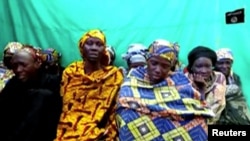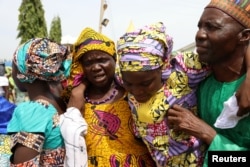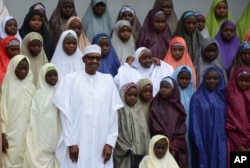Since their abduction the night of April 14, 2014, some of the girls kidnapped from Chibok, Nigeria have escaped their captors - the armed militant group Boko Haram. Others were freed through negotiations. But 112 Chibok girls are still missing.
Esther Yakubu's daughter, Dorcas, is among them.
Esther has been an outspoken activist. For years, she marched to the steps of the Nigerian presidential villa in the capital of Abuja with the Bring Back Our Girls protestors. She's carried placards. She's cried in the public and she's chanted, "Bring Back Our Girls, Bring Back Our Girls!" at the top of her voice.
Now, after four years of waiting for Dorcas, Esther is tired. She has nothing more to say to the Nigerian government.
"No message. Only prayers," she told VOA.
She tries to take solace in knowing that other Chibok girls have been reunited with their families.
"Even though our baby is not back, you know, we have a lot of girls that are back now. We appreciate it."
Dorcas will soon be turning 20 years old. Her mother wonders what type of young woman she has become, living with terrorists.
The last time she saw her daughter was in a video that Boko Haram released in 2017. In the video, a Boko Haram member, clad in military fatigue, had singled out Dorcas, telling her to speak into the mic. Dorcas looks into the camera to deliver a message for the Nigerian government to release Boko Haram members who are in protective custody so that she and the other Chibok girls can be released.
But that video was months ago. Esther has no idea if her daughter is still alive.
The Chibok girls were Boko Haram's largest single kidnapping, but they represent a pattern of violence in the now nine-year conflict.
On Friday, the U.N. children's fund released new findings, reporting that Boko Haram has abducted more than 1,000 school-aged children since 2013. UNICEF said more than 2,000 teachers have been killed and 1,400 schools destroyed. UNICEF said there are "few safe spaces left for children in the northeast."
"Absolutely nothing has changed since the abduction of the Chibok girls," said Evon Benson-Idahosa, who runs Bring Back Our Girls NYC. "The fact that innocent children still remain vulnerable to being kidnapped and abducted and trafficked at will, I think, is indicative of the fact that Nigeria is not in a place where Bring Back Our Girls movement can step back or be less demanding for the security of all our children."
The brazen abduction in February of more than 100 female students from a government high school in another northeastern town, Dapchi, contradicts the Nigerian government's repeated claim that Boko Haram has been defeated.
Amnesty International noted similarities in the abductions of the Dapchi Girls in 2018 and the Chibok Girls in 2014. And Amnesty said Nigerian security forces ignored warnings of the Dapchi attack.
"This will never end," said Samira Daoud, a deputy regional director in Amnesty International's West and Central Africa regional office. "The Nigerian government seems not to have learned any lesson from what happened and haven't taken any kind of measure to ensure that this would never happen again and if it can happen exactly the same way four years after, that means that the government is not listening."
But the Nigerian government disputes that criticism.
President Muhammadu Buhari has repeatedly touted his administration's efforts to return the Chibok girls. Nearly all of the Dapchi girls were returned a month after their abduction, though the circumstances of their release remain unclear.
Bashir Talbari, the special assistant to the governor of Borno State, where Chibok is located, said citizens should do less criticizing and more collaborating with the government.
"At the initial stage when the girls that were abducted, it was the efforts of the Borno State government for names to be placed on the faces of the girls. You see, sometimes security is a collective responsibility. The citizens themselves have to also take part in ensuring the safety of their environment," Talbari told VOA.
For the people of Chibok, the government has largely failed. The girls' school where the abduction happened has still not re-opened. High school students have to use the primary school to continue their education.
Allen Manasseh, a Chibok native whose niece is among the missing girls, hopes to take his advocacy to the Nigeria's parliament. He is running for a seat in the House of Representatives.
"Government actions must translate into touching directly the lives of the people. Not just talking, we are doing everything possible, we are doing everything possible, day in, day out, you are doing your best and your best cannot translate into something," Manasseh said.
Mannasseh plans to attend the four-year commemoration activities in Abuja this weekend. Other events are being planned around the world. Organizers say they expect the crowds to be significantly smaller. But they will forge ahead anyway.







